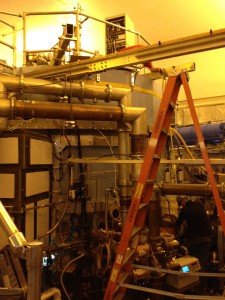On May 20, the Boston Globe wrote an article, “Fusion program at MIT is ending, Layoffs predicted; federal funds cut.” The article was about the slated closure of MIT’s fusion facility, the Alcator C-Mod. This is a demonstration of the tangible impacts of the Obama Administration’s decision to pair back fusion funding.
Carolyn Johnson’s article in the Boston Globe points out that unless Congress acts to appropriate more funding, the facility will have to go into “cold” shutdown.
This budgetary process began in April, when the Administration released their FY2014 budget request, more than two months late. In this budget, America’s research program to develop fusion as an energy source continued its dangerous to spiral into irrelevance.
For background, the Office of Fusion Energy Sciences, which covers the Magnetic Fusion Energy program, is within the Department of Energy’s Office of Science. In the budget request, the Administration asks for $458.3 million, of which $225 million is the U.S. contribution to the intentional ITER Project, and the remaining $233 million is for research and operations at America’s domestic labs (see the full budget justification here).
ITER is funded by six nations, including the United States, plus the European Union. The American contribution only amounts to 9% of the entire project, and our scientists will gain 100% of the results. The bulk of the funding for US ITER will be spent on contracts and programs within the United States. ITER is a critical component of fusion research; it will be the largest magnetic fusion facility ever constructed, and be a stepping stone on the way to full commercialization.
 However, if there is not a vibrant domestic program, which would most likely include MIT’s Alcator C-MOD reactor and a plan for operations at other research facilities around the country, then American scientists cannot take advantage of the breakthroughs from ITER. ASP’s 10 year plan for fusion research would give the country the scientific base to take advantage of ITER. On the other hand, if the fusion budget continues its current trajectory, then America’s scientists will be left behind – or, as the Boston Globe article says, they will go looking for work in other countries.
However, if there is not a vibrant domestic program, which would most likely include MIT’s Alcator C-MOD reactor and a plan for operations at other research facilities around the country, then American scientists cannot take advantage of the breakthroughs from ITER. ASP’s 10 year plan for fusion research would give the country the scientific base to take advantage of ITER. On the other hand, if the fusion budget continues its current trajectory, then America’s scientists will be left behind – or, as the Boston Globe article says, they will go looking for work in other countries.
However – over the last month since the budget was released, there has been some notable opposition in Congress to the budget cuts.
First, Senators Feinstein, Alexander, Wyden, and Murkowski (Chair and Ranking Members of the Senate Energy and Water Appropriations Subcommittee and the Energy and Natural Resources Committee, respectively) sent a letter to the General Accounting Office (GAO) requesting an investigation into what the full cost of ITER will be. If thoroughly conducted, this investigation could allow both Congressional committees to begin to put a plan together.
Second, is a bipartisan letter signed by 50 Members of the House of Representatives to Chairman Frelinghuysen and Ranking Member Kaptur of the House Appropriations Subcommittee on Energy and Water (who control funding for fusion). The letter expressing support for a level of funding in the FY14 bill that would be enough to keep MIT open. This is evidence that there may be momentum to undo the DOE’s proposed cuts.
Third, Governor Deval Patrick of Massachusetts sent a letter to Secretary Moniz expressing his opposition to the cuts.
Fourth, Senators Warren and Cowen sent a letter on May 20 to new Secretary Moniz expressing their opposition to the cuts, and concern about the DoE surpassing its authority.
Finally, the entire Massachusetts delegation to Congress signed an April letter to Under Secretary of Energy Poneman that expressed support for MIT’s Alcator C-Mod. They further raised a concern that the Department of Energy is ignoring Congressional intent, because at no time has Congress authorized or appropriated funds to close MIT’s Alcator. Moreover, as the government is currently operating under a ‘Continuing Resolution’ for this fiscal year, it is illegal to end current programs.
Ultimately, the reactor at MIT is important – it is one of only three in the country. Alcator conducts research on plasma confinement, one of the remaining engineering challenges for fusion energy. It is especially important for training the graduate students – there will be a 25% reduction in fusion grad students due to this closure.
However, the broader problem raised by the Administration’s budget is the lack of a plan for fusion research. If we want to take the lead on research in developing a clean, safe, and secure energy source for the 21st Century, we must do better than this. ASP has a plan, where is the Administration’s plan?
[Updated on 5/21/13 to include the letter from Governor Deval Patrick]
[Updated again on 5/22/13 to include the letter from Senators Warren and Cowen]



